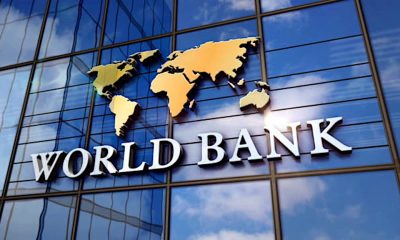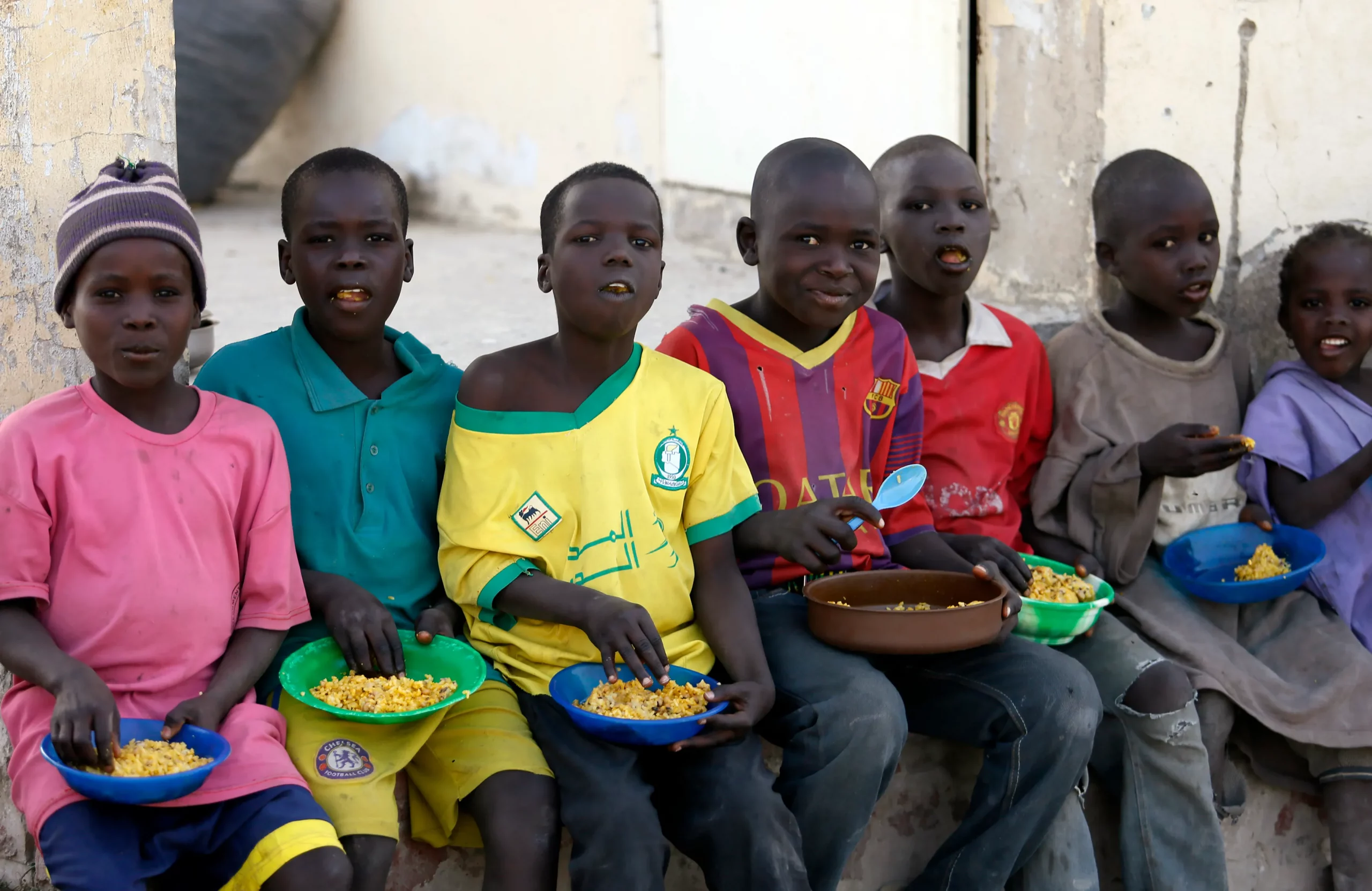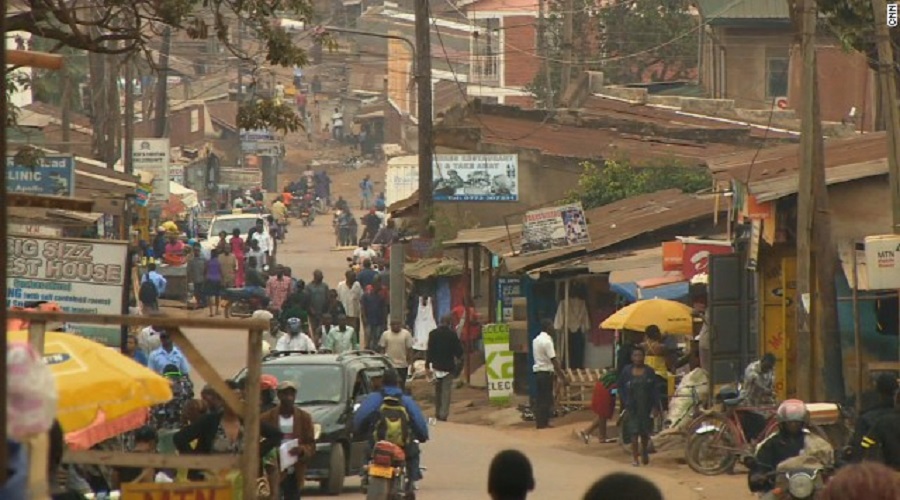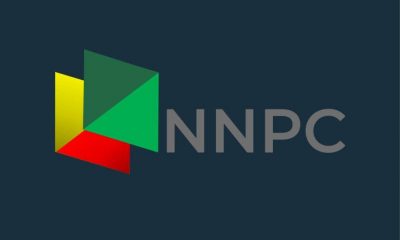World
World Bank, IMF and Africa’s Development
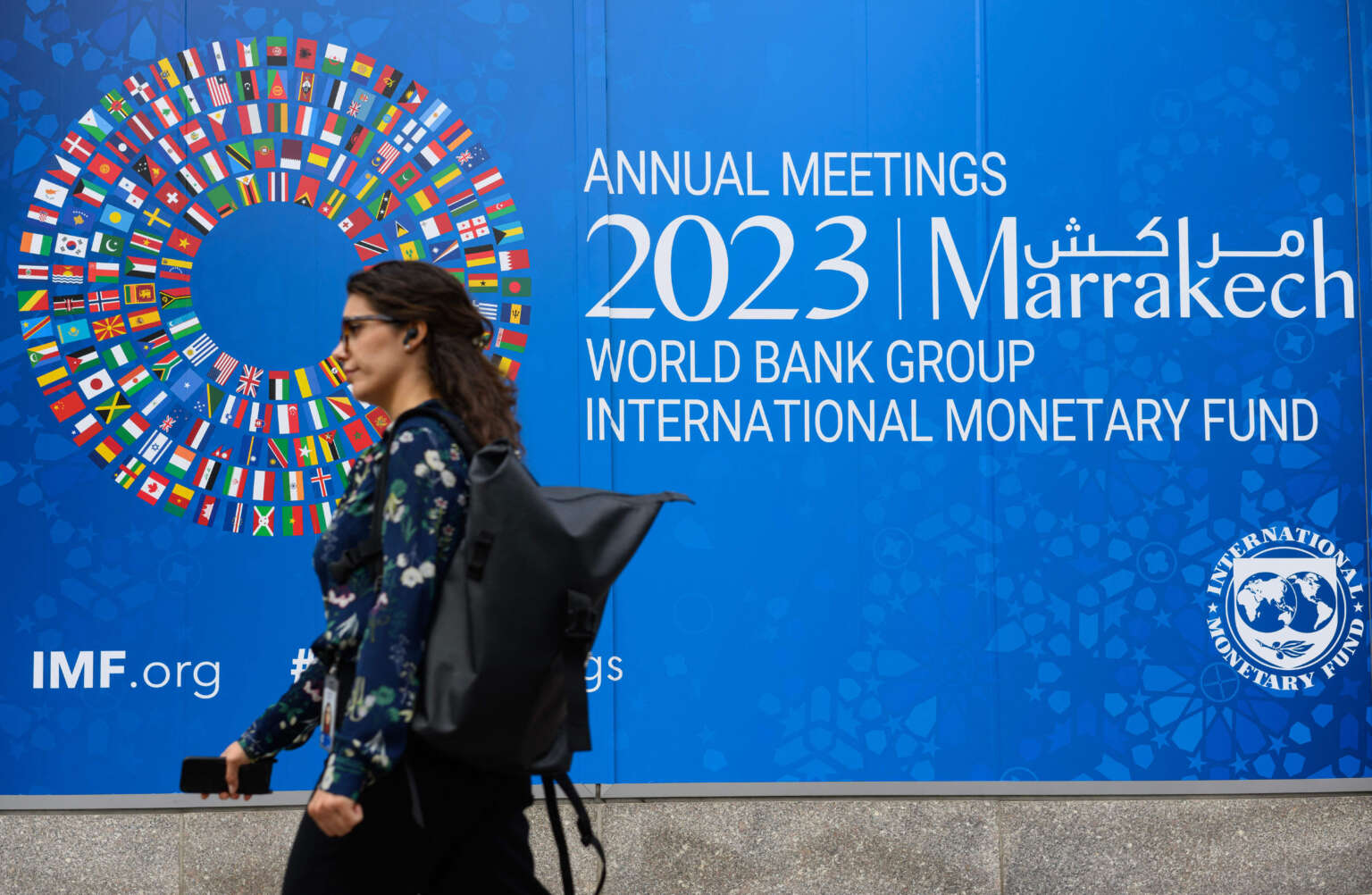
By Professor Maurice Okoli
Amid heightened criticisms and intense debates over several significant global issues including new financial architecture, economic diversification, growing debts and reforms, the International Monetary
Fund (IMF) and the World Bank, on October 15 wrapped up their week-long annual meetings held under the theme “Global Action, Global Impact” in Marrakesh, Morocco in North Africa.
With the rapid geopolitical changes, it featured prominently finance ministers and central bank governors from 190 countries in desperate search of comprehensive mechanisms and suitable approaches to address the prevailing economic crisis across the globe. The coordinated annual meetings also reviewed its scope of geographical operations with particular emphasis on Africa.
Fundamentally Africa’s key drawbacks mostly mentioned in all the discussions are related to the system of governance, official policies and strategies, and persistent conflicts. Due to the severity of threatening conflicts combined with worsening insecurity and ineffective policies, speakers at the annual meetings reviewed with circumspection the economic performance in Africa.
The importance of this annual meeting particularly for Africa need not be over-emphasized. Of course, the popular paradox is that Africa has huge untapped resources including rich deposits of strategic minerals, the population is growing and now stands at 1.4 billion providing the human capital and yet that region is engulfed with abject poverty, lack of industrial infrastructure and technology, while agriculture largely remains at the rudimentary stage. It is impossible not to notice on the political map of the world – it is located roughly in the centre of the globe just on the equator and its huge expanse of territory.
Economic Picture
The global financial system “is now outdated, dysfunctional and unjust,” said a New York Times opinion column jointly written by Kenyan President William Ruto, African Development Bank President Akinwumi Adesina, African Union Commission chairman Moussa Faki and Patrick Verkooijen, chief executive of the Global Commission on
Adaptation.
It’s outdated because international financial institutions “are too small and limited to fulfil their mandate. Dysfunctional because the system as a whole is too slow to respond to new challenges, such as climate change. And unjust because it discriminates against poor countries,” the leaders wrote.
Often lenders of last resort, the IMF and the World Bank use billions in loans and assistance to buoy struggling economies and encourage countries operating in deficit to implement reforms they say promote stability and economic growth.
During a panel session in Marrakech second week of October 2023, African Ministers of Finance, Planning and Economic Development called for key reforms during a meeting of the Africa High-Level Working Group on the Global Financial Architecture, coordinated by the Economic Commission for Africa (ECA). The ECA has the mandate
to promote the economic and social development of its member states, foster intra-regional integration, and promote international cooperation for Africa’s development.
Their position, among others, was to strengthen the African voice on the global stage. This resounding call emphasized the need for a quota formula to increase the number share for Africa. The meeting expressed support for the establishment of an additional chair to represent African countries at the IMF Executive Board to amplify the region’s voice and representation.
The meeting further underscored the importance of scaling up both concessional and non-concessional financing priorities of African countries, including regional integration, infrastructure development and structural transformation. Also, there was the proposal for temporal suspension of debt service and to pause debt service payments in the event of climate-related disasters.
At the opening ceremony, IMF Chief Kristalina Georgieva in a speech stated that since 2020, successive economic shocks have led to the loss of $3.6 trillion of the global output, and that have pushed the IMF and the World Bank in hollowing for an enduring role in addressing the socio-economic challenges.
Fifty-seven per cent of the world’s poorest countries, home to about 30 per cent of the world’s population, will have to cut their public spending by $229 billion by 2029. Low and lower-middle-income countries will be forced to pay almost $500 million every day in interest and debt repayments from now until that year, according to her suggestion.
Role of the Financial Institutions
The African Development Bank, the Asian Development Bank, the Asian Infrastructure Investment Bank, the Council of Europe Development Bank, the European Bank for Reconstruction and Development, the European Investment Bank, the Inter-American Development Bank, the Islamic Development Bank, and the New Development Bank joined the World Bank in the collaboration agreement.
World Bank together with other nine multilateral development banks jointly seek to boost lending power to developing countries. These banks pledged to bolster collaboration in accelerating an appreciable, liveable world free of poverty. Under consideration is estimated $300 billion to $400 billion of additional lending capacity to help developing countries confront “a perfect storm of intertwined crises — from climate shocks and conflicts to pandemics and surging debt.”
They would also work to catalyze private-sector engagement. In addition, and as incorporated in the official document after the summit, the World Bank will be strengthening efforts to partner with the private sector, civil society, other multilateral institutions, and charitable organizations.
Some experts are of the view that the banks should also release emerging market data so private investors can better understand the actual risks and opportunities of investing in such markets. According to economic experts, exploring ways to directly increase the voice of emerging markets and developing countries in the IMF by adding another deputy managing director to represent emerging markets and low-income countries, and a third executive board chair representing sub-Saharan Africa.
“Working together for a common cause, we can bring more experience, expertise, knowledge, and, especially, more funding to the massive challenges facing the world today,” World Bank President Ajay Banga said. “Together, we are greater than the sum of our parts.”
In addition to improved analytical and diagnostic tools, including country climate and development reports, the multilateral banks have to work on principles for using concessional finance to target support for projects that address the challenges. Concessional finance involves loans at more generous terms than the market provides. The socio-cultural conditions should also form part of the decision-making process for extending these loans to accelerate private sector mobilization.
African States Struggling with Debts
International Monetary Fund chief Kristalina Georgieva called for wealthy nations to provide more support to debt-saddled developing countries, and to better help vulnerable nations deal with poverty and climate change, as she opened the first IMF-World Bank meetings on African soil in 50 years. The global lenders traditionally hold their annual gathering of finance ministers and central bank governors outside their Washington headquarters every three years.
The IMF and World Bank last held their meetings in Africa in 1973, when Kenya hosted the event and some nations were still under colonial rule. Half a century later, the continent faces various challenges ranging from conflict to a series of military coups to unrelenting poverty to natural disasters.
“Bringing the meetings to Africa, again, is symbolically and substantively very important,” Georgieva said at a meeting with members of civil society organizations. She noted that the continent is wrestling with “remarkably similar” problems as 50 years ago, including high inflation and “political upheaval in many places”.
“Many countries are under a burden of debt that can crush them and we very, very much hope that the meetings would be a place to build more trust among nations. We all need each other,” she said and added that the IMF and World Bank need “more capacity” to support African countries that need help, including providing zero-interest loans on a larger scale.
In the final analysis, China has to be considered for an increase in a quota within the institutions and given more representation if it played an active role in debt relief for low-income countries. China has already considered some African countries for addressing issues of debt restructuring deals, for instance, Angola, Egypt, Nigeria, Zambia and a few others.
It was also the result of several direct consultations by the US Treasury Secretary Janet Louise Yellen and other officials, trying to pressure and coax China — the largest creditor to the developing world — into participating more readily in such agreements. There are also proposals to seriously look at ways to revive the effectiveness and monitoring of funds utilization on the continent. Expectations are high for a breakthrough.
President Abdel-Fattah El-Sisi is looking to extend his rule until 2030. And Egypt seeks to boost IMF loan to over $5 billion amid currency woes, according to the discussions made available on the government’s website. A mission from the IMF may visit Egypt to start the two reviews around the end of October. Egypt owes nearly $22 billion to
the IMF, according to Egypt’s central bank which I found during my research for this article.
With regards to Africa, the IMF and World Bank need to take into serious account the ‘cultural change’ to better mobilize private capital. The process of reforming its operations to better address climate change and other numerous challenges requires an endorsement of a new vision “to end poverty on a livable planet” and that is what its new president, Ajay Banga, was working to turn into reality.
Under the auspices of the African Union, African leaders have to collectively within the framework of “African Problems, African Solutions” in this changing world. While calling for reforms in international organizations, the African Union also needs an urgent overhaul to effectively and rationally address the continent’s security and development issues. Africa does not need any “global coalition of democracies” to fight violent extremist groups, especially in West Africa that have been spreading south from the Sahel region. It requires African continental and/or regional forces with external support rather than bilateral mechanisms.
Fresh Hopes for a Better Future
A new tool developed by the Center for Global Development (CGD), and launched to track reforms by the World Bank and the five biggest multilateral development banks (MDBs), shows that broad changes are “firmly in play” but progress in implementing them has been limited thus far. The new platform assesses progress being made on reforms, but at the same time, concludes progress in implementing the changes was “quite limited.”
The CGD researchers however lauded some steps taken – including the World Bank’s inclusion of the phrase “livable planet” in its mission statement, but said the development banks were still largely debating how to integrate global challenges into their operations and how to pay for them.
Anna Bjerde, the World Bank’s managing director for operations, said she had been at the bank for 27 years and had never felt such energy and momentum for changing course. “To make a change in the work we’re in will, of course, take time,” Bjerde said, noting decisions already made at the spring meetings of the IMF and World Bank would boost financing and further steps were expected at the meeting in Morocco.
Critics have argued for years that MDBs manage their balance sheets too conservatively and could unlock significantly more capital without losing their AAA credit rating status. They said the reform discussion was also largely dominated by Northern Hemisphere voices and major emerging markets like China, India and Brazil, and it was crucial to include more MDB borrowing countries and address their goals and concerns.
“We have already seen notable progress in areas like raising lending limits and launching innovative finance programs,” former senior Treasury official Nancy Lee and other researchers wrote in a blog unveiling the tool. “Many reforms are still in the aspiration phase rather than the implementation phase.”
Axel Van Trostsenburg, Senior Managing Director, Development Policy and Partnership, World Bank, made known, during panel discussions, that the International Development Association (IDA), a World Bank subsidiary, is making available $70 billion of its $93 billion replenishing to Africa to support digital infrastructure and other developments.
In his idealistic view, physical-digital infrastructure needs to be developed and linked to the acceleration of the implementation and realization of the objectives of the African Continental Free Trade Area (AfCFTA). The AfCFTA is purposefully created as a single borderless market for free movement of goods products, people and services across Africa.
And it is only through digital development that we see an incredible increase in economic growth under AfCFTA. In this case, there is the necessity to engage the African leadership. This also requires the adoption of a multi-set of approaches in helping countries with regulatory frameworks, setting up infrastructure and mobilising private sector finance for digital development.
Perhaps, this is the appropriate moment for Africa to be very objective while asking for feverish reforms, such steps must begin also at home. African leaders can hardly escape some responsibility for the present state of affairs, the level of economic development and existing social welfare for the people in Africa. The African Union and the Regional Economic blocs or associations have to watch their reflections in the mirror if their platforms have undergone valuable and effective reforms necessary to achieve their fundamental development goals across the continent, at least over the past decade.
Reading through reports, the African Union’s assessment of the multinational financial banks notes the possibility of scaling up adequate funds to grease commitments, as many African countries now face the reality of growing debts that in some cases threaten to destabilize their economies. That, however, financing development objectives would have to noticeably change the expected economic progress and the landscape of bad infrastructure across Africa.
In a symbolic move, the IMF and World Bank are poised to give Africa a third seat on their executive boards. The summit’s final report has offered irreversible practical hopes for Africa. That would be a testament to the resilience on the part of the African community. But still, the African Union and Regional Economic blocs and associations have to engage in discussing and reviewing the ultimate work of international financial institutions to stand ready to support Sustainable Development Goals (SDGs).
Professor Maurice Okoli is a fellow at the Institute for African Studies and the Institute of World Economy and International Relations, Russian Academy of Sciences. He is also a fellow at the North-Eastern Federal University of Russia. He is an expert at the Roscongress Foundation and the Valdai Discussion Club.
As an academic researcher and economist with a keen interest in current geopolitical changes and the emerging world order, Maurice Okoli frequently contributes articles for publication in reputable media portals on different aspects of the interconnection between developing and developed countries, particularly in Asia, Africa and Europe. With comments and suggestions, he can be reached via email: markolconsult (at) gmail (dot) com
World
African Visual Art is Distinguished by Colour Expression, Dynamic Form—Kalalb

By Kestér Kenn Klomegâh
In this insightful interview, Natali Kalalb, founder of NAtali KAlalb Art Gallery, discusses her practical experiences of handling Africa’s contemporary arts, her professional journey into the creative industry and entrepreneurship, and also strategies of building cultural partnership as a foundation for Russian-African bilateral relations. Here are the interview excerpts:
Given your experience working with Africa, particularly in promoting contemporary art, how would you assess its impact on Russian-African relations?
Interestingly, my professional journey in Africa began with the work “Afroprima.” It depicted a dark-skinned ballerina, combining African dance and the Russian academic ballet tradition. This painting became a symbol of cultural synthesis—not opposition, but dialogue.
Contemporary African art is rapidly strengthening its place in the world. By 2017, the market was growing so rapidly that Sotheby launched its first separate African auction, bringing together 100 lots from 60 artists from 14 foreign countries, including Algeria, Ghana, Mali, Nigeria, Senegal, and others. That same year during the Autumn season, Louis Vuitton Foundation in Paris hosted a major exhibition dedicated to African art. According to Artnet, sales of contemporary African artists reached $40 million by 2021, a 434% increase in just two years. Today, Sotheby holds African auctions twice a year, and in October 2023, they raised $2.8 million.
In Russia, this process manifests itself through cultural dialogue: exhibitions, studios, and educational initiatives create a space of trust and mutual respect, shaping the understanding of contemporary African art at the local level.
Do you think geopolitical changes are affecting your professional work? What prompted you to create an African art studio?
The international context certainly influences cultural processes. However, my decision to work with African themes was not situational. I was drawn to the expressiveness of African visual language—colour, rhythm, and plastic energy. This theme is practically not represented systematically and professionally in the Russian art scene.
The creation of the studio was a step toward establishing a sustainable platform for cultural exchange and artistic dialogue, where the works of African artists are perceived as a full-fledged part of the global cultural process, rather than an exotic one.
To what extent does African art influence Russian perceptions?
Contemporary African art is gradually changing the perception of the continent. While previously viewed superficially or stereotypically, today viewers are confronted with the depth of artistic expression and the intellectual and aesthetic level of contemporary artists.
Portraits are particularly impactful: they allow us to see not just an abstract image of a “continent,” but a concrete personality, character, and inner dignity. Global market growth data and regular auctions create additional trust in African contemporary art and contribute to its perception as a mature and valuable movement.
Does African art reflect lifestyle and fashion? How does it differ from Russian art?
African art, in my opinion, is at its peak in everyday culture—textiles, ornamentation, bodily movement, rhythm. It interacts organically with fashion, music, interior design, and the urban environment. The Russian artistic tradition is historically more academic and philosophical. African visual art is distinguished by greater colour expression and dynamic form. Nevertheless, both cultures are united by a profound symbolic and spiritual component.
What feedback do you receive on social media?
Audience reactions are generally constructive and engaging. Viewers ask questions about cultural codes, symbolism, and the choice of subjects. The digital environment allows for a diversity of opinions, but a conscious interest and a willingness to engage in cultural dialogue are emerging.
What are the key challenges and achievements of recent years?
Key challenges:
- Limited expert base on African contemporary art in Russia;
- Need for systematic educational outreach;
- Overcoming the perception of African art as exclusively decorative or ethnic.
Key achievements:
- Building a sustainable audience;
- Implementing exhibition and studio projects;
- Strengthening professional cultural interaction and trust in African
contemporary art as a serious artistic movement.
What are your future prospects in the context of cultural diplomacy?
Looking forward, I see the development of joint exhibitions, educational programs, and creative residencies. Cultural diplomacy is a long-term process based on respect and professionalism. If an artistic image is capable of uniting different cultural traditions in a single visual space, it becomes a tool for mutual understanding.
World
Ukraine Reveals Identities of Nigerians Killed Fighting for Russia

By Adedapo Adesanya
The Ukrainian Defence Intelligence (UDI) has identified two Nigerian men, Mr Hamzat Kazeem Kolawole and Mr Mbah Stephen Udoka, allegedly killed while fighting as Russian mercenaries in the war between the two countries ongoing since February 2022.
The development comes after Russia denied knowledge of Nigerians being recruited to fight on the frontlines.
Earlier this week, the Russian Ambassador to Nigeria, Mr Andrey Podyolyshev, said in Abuja that he was not aware of any government-backed programme to recruit Nigerians to fight in the war in Ukraine.
He said if at all such activity existed, it is not connected with the Russian state.
However, in a statement on Thursday, the Ukrainian Defence released photographs of Nigerians killed while defending Russia.
“In the Luhansk region, military intelligence operatives discovered the bodies of two citizens of the Federal Republic of Nigeria — Hamzat Kazeen Kolawole (03.04.1983) and Mbah Stephen Udoka (07.01.1988),” the statement read.
According to the statement, both men served in the 423rd Guards Motor Rifle Regiment (military unit 91701) of the 4th Guards Kantemirovskaya Tank Division of the armed forces of the Russian Federation.
UDI said that they signed contracts with the Russian Army in the second half of 2025 – the deceased Mr Kolawole on August 29 and Mr Udoka on September 28.
“Udoka received no training whatsoever — just five days later, on October 3, he was assigned to the unit and sent to the temporarily occupied territories of Ukraine,” the report read.
It added that no training records for Mr Kolawole have been preserved; however, it is highly likely that he also received no military training, but his wife and three children remain in Nigeria.
Both Nigerians, the report added, were killed in late November during an attempt to storm Ukrainian positions in the Luhansk region.
“They never engaged in a firefight — the mercenaries were eliminated by a drone strike,” UDI stated, warning foreign citizens against travelling to the Russian Federation or taking up any work on the territory of the “aggressor state”.
“A trip to Russia is a real risk of being forced into a suicide assault unit and, ultimately, rotting in Ukrainian soil,” the statement read.
In an investigation earlier this month, CNN reported that hundreds of African men have been enticed to fight for Russia in Ukraine with the promise of civilian jobs and high salaries. However, the media organisation uncovered that they are being deceived or sent to the front lines with little combat training.
CNN said it reviewed hundreds of chats on messaging apps, military contracts, visas, flights and hotel bookings, as well as gathering first-hand accounts from African fighters in Ukraine, to understand just how Russia entices African men to bolster its ranks.
World
Today’s Generation of Entrepreneurs Value Flexibility, Autonomy—McNeal-Weary

By Kestér Kenn Klomegâh
The Young African Leaders Initiative (YALI) is the United States’ signature step to invest in the next generation of African leaders. Since its establishment in 2010 by Obama administration, YALI has offered diverse opportunities, including academic training in leadership, governance skills, organizational development and entrepreneurship, and has connected with thousands of young leaders across Africa. This United States’ policy collaboration benefits both America and Africa by creating stronger partnerships, enhancing mutual prosperity, and ensuring a more stable environment.
In our conversation, Tonya McNeal-Weary, Managing Director at IBS Global Consulting, Inc., Global Headquarters in Detroit, Michigan, has endeavored to discuss, thoroughly, today’s generation of entrepreneurs and also building partnerships as a foundation for driving positive change and innovation in the global marketplace. Here are the excerpts of her conversation:
How would you describe today’s generation of entrepreneurs?
I would describe today’s generation of entrepreneurs as having a digital-first mindset and a fundamental belief that business success and social impact can coexist. Unlike the entrepreneurs before them, they’ve grown up with the internet as a given, enabling them to build global businesses from their laptops and think beyond geographic constraints from day one. They value flexibility and autonomy, often rejecting traditional corporate ladders in favor of building something meaningful on their own terms, even if it means embracing uncertainty and financial risk that previous generations might have avoided.
And those representing the Young African Leaders Initiative, who attended your webinar presentation late January 2026?
The entrepreneurs representing the Young African Leaders Initiative are redefining entrepreneurship on the continent by leveraging their unique perspectives, cultural heritage, and experiences. Their ability to innovate within local contexts while connecting to global opportunities exemplifies how the new wave of entrepreneurs is not confined by geography or conventional expectations.
What were the main issues that formed your ‘lecture’ with them, Young African Leaders Initiative?
The main issues that formed my lecture for the Young African Leaders Initiative were driven by understanding the importance of building successful partnerships when expanding into the United States or any foreign market. During my lecture, I emphasized that forming strategic alliances can help entrepreneurs navigate unfamiliar business environments, access new resources, and foster long-term growth. By understanding how to establish strong and effective partnerships, emerging leaders can position their businesses for sustainable success in global markets. I also discussed the critical factors that contribute to successful partnerships, such as establishing clear communication channels, aligning on shared goals, and cultivating trust between all parties involved. Entrepreneurs must be proactive in seeking out partners who complement their strengths and fill gaps in expertise or resources. It is equally important to conduct thorough due diligence to ensure that potential collaborators share similar values and ethical standards. Ultimately, the seminar aimed to empower YALI entrepreneurs with practical insights and actionable strategies for forging meaningful connections across borders. Building successful partnerships is not only a pathway to business growth but also a foundation for driving positive change and innovation in the global marketplace.
What makes a ‘leader’ today, particularly, in the context of the emerging global business architecture?
In my opinion, a leader in today’s emerging global business architecture must navigate complexity and ambiguity with a fundamentally different skill set than what was previously required. Where traditional leadership emphasized command-and-control and singular vision, contemporary leaders succeed through adaptive thinking and collaborative influence across decentralized networks. Furthermore, emotional intelligence has evolved from a soft skill to a strategic imperative. Today, the effective modern leader must possess deep cross-cultural intelligence, understanding that global business is no longer about exporting one model worldwide but about genuinely integrating diverse perspectives and adapting to local contexts while maintaining coherent values.
Does multinational culture play in its (leadership) formation?
I believe multinational culture plays a profound and arguably essential role in forming the kind of leadership required in today’s global business environment. Leaders who have lived, worked, or deeply engaged across multiple cultural contexts develop a cognitive flexibility that’s difficult to replicate through reading or training alone. More importantly, multinational exposure tends to dismantle the unconscious certainty that one’s own way of doing things is inherently “normal” or “best.” Leaders shaped in multicultural environments often develop a productive discomfort with absolutes; they become more adept at asking questions, seeking input, and recognizing blind spots. This humility and curiosity become strategic assets when building global teams, entering new markets, or navigating geopolitical complexity. However, it’s worth noting that multinational experience alone doesn’t automatically create great leaders. What matters is the depth and quality of cross-cultural engagement, not just the passport stamps. The formation of global leadership is less about where someone has been and more about whether they’ve developed the capacity to see beyond their own cultural lens and genuinely value differences as a source of insight rather than merely tolerating them as an obstacle to overcome.
In the context of heightening geopolitical situation, and with Africa, what would you say, in terms of, people-to-people interaction?
People-to-people interaction is critically important in the African business context, particularly as geopolitical competition intensifies on the continent. In this crowded and often transactional landscape, the depth and authenticity of human relationships can determine whether a business venture succeeds or fails. I spoke on this during my presentation. When business leaders take the time for face-to-face meetings, invest in understanding local priorities rather than imposing external agendas, and build relationships beyond the immediate transaction, they signal a different kind of partnership. The heightened geopolitical situation actually makes this human dimension more vital, not less. As competition increases and narratives clash about whose model of development is best, the businesses and nations that succeed in Africa will likely be those that invest in relationships characterized by reciprocity, respect, and long-term commitment rather than those pursuing quick wins.
How important is it for creating public perception and approach to today’s business?
Interaction between individuals is crucial for shaping public perception, as it influences views in ways that formal communications cannot. We live in a society where word-of-mouth, community networks, and social trust areincredibly important. As a result, a business leader’s behavior in personal interactions, their respect for local customs, their willingness to listen, and their follow-through on commitments have a far-reaching impact that extends well beyond the immediate meeting. The geopolitical dimension amplifies this importance because African nations now have choices. They’re no longer dependent on any single partner and can compare approaches to business.
From the above discussions, how would you describe global business in relation to Africa? Is it directed at creating diverse import dependency?
While it would be too simplistic to say global business is uniformly directed at creating import dependency, the structural patterns that have emerged often produce exactly that outcome, whether by design or as a consequence of how global capital seeks returns. Global financial institutions and trade agreements have historically encouraged African nations to focus on their “comparative advantages” in primary commodities rather than industrial development. The critical question is whether global business can engage with Africa in ways that build productive capacity, transfer technology, develop local talent, and enable countries to manufacture for themselves and for export—or whether the economic incentives and power irregularities make this structurally unlikely without deliberate policy intervention.
-

 Feature/OPED6 years ago
Feature/OPED6 years agoDavos was Different this year
-
Travel/Tourism10 years ago
Lagos Seals Western Lodge Hotel In Ikorodu
-

 Showbiz3 years ago
Showbiz3 years agoEstranged Lover Releases Videos of Empress Njamah Bathing
-

 Banking8 years ago
Banking8 years agoSort Codes of GTBank Branches in Nigeria
-

 Economy3 years ago
Economy3 years agoSubsidy Removal: CNG at N130 Per Litre Cheaper Than Petrol—IPMAN
-

 Banking3 years ago
Banking3 years agoSort Codes of UBA Branches in Nigeria
-

 Banking3 years ago
Banking3 years agoFirst Bank Announces Planned Downtime
-

 Sports3 years ago
Sports3 years agoHighest Paid Nigerian Footballer – How Much Do Nigerian Footballers Earn





